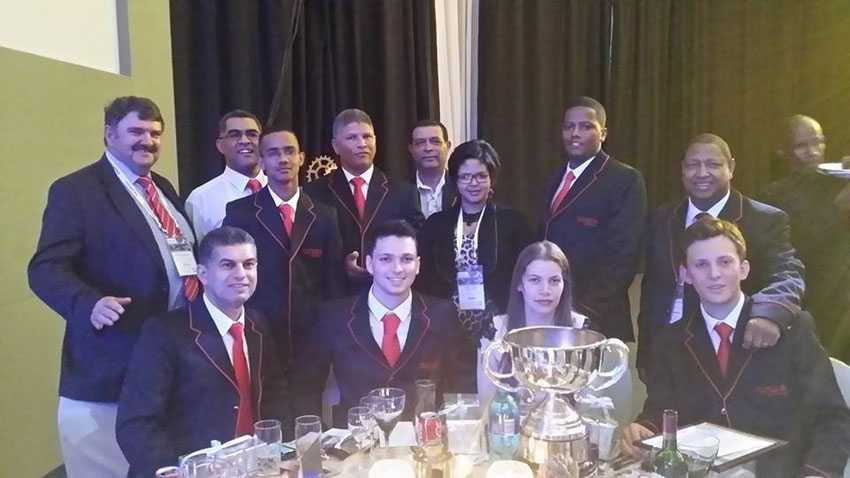The annual Siemens Cyber Junkyard competition, sponsored and arranged by Siemens, took place in Johannesburg on 27 October 2014. After a hectic day of interviews, presentations, physical demonstrations and testing of the competition entries, College of Cape Town took first prize in the 2014 competition.
In previous years’ competitions, teams were required to recreate and automate a project defined by Siemens. This year, students taking part in the Cyber Junkyard 2014 had to conceptualise and build automated machines to address a need in the industries that they had nominated.
Each project had to include a detailed business plan for their product. During the competition, the students had to pitch their ideas and business plans to a team of industry experts in a format not dissimilar to the popular television show, Dragon’s Den.
The College of Cape Town team, which consisted of National Certificate (Vocational) Level 2 and 4 students, and an N5 student, designed and manufactured an automated fluid bed coffee bean roaster named the Collegiate RGB52, which already has the coffee roasting industry in Cape Town buzzing with excitement!
The RGB52 fluid bed roaster is fitted with Siemens HMI colour touch panels to monitor the process, as well as a Siemens S71200 PLC with PID controls.
“South Africa needs dedicated and well trained engineers. But we also need people with a vision for the future. People with creativity and a talent for engineering solutions beyond everyday thinking.
In a country with such high unemployment, entrepreneurial skills are not only essential to the engineers of tomorrow, but also to the communities in which they create opportunities when their businesses become successful,” said Raymond Padayachee, Vice President: Process Industries and Drives, Siemens Southern and Eastern Africa.
The College of Cape Town team consists of Nisrine Jirari (team leader and process controller), David Dyers (software developer), Bertram Blankenberg (electrical engineering), Kevin Tjihero (mechanical engineering), Aaron Milner (finances), Magdalene Pretorius (marketing); lecturers Mark Wichman, Ricardo Croy and Chris Josephs; and academic manager Pat Lawrence.
Not only did this dedicated group of students design and develop a product perfectly suited for the South African and African market, but they took their passion one step further and obtained certification as baristas, thereby ensuring that the knowledge and skills applied to their product is based on understanding the end-product and consumers’ expectations.
“We are extremely proud of the achievements of this dedicated and passionate team of young aspiring engineers,” said Louis van Niekerk, Principal and CEO of College of Cape Town.
“This project challenged not only their engineering skills, but inspired their minds to identify a unique need and develop a product to address that need through bringing the production of this coffee bean roaster onto South African soil.
This concept will be saving business owners from spending millions on importing roasting machines whilst creating job opportunities in the future through the planned production of the Collegiate RGB52, and the other products planned to expand the range.
“The success of these young students showcases the achievements and quality education offered via the National Certificate (Vocational) and Report 191 programmes at public TVET Colleges. Competing against, and winning first prize against universities and Universities of Technology engineering students certainly shows that TVET Colleges deliver.
Through industry partners such as Siemens and the merSETA, TVET colleges are able to excel at meeting industry needs,” said Van Niekerk.
The College of Cape Town receives R100,000 in Siemens products, and the students will benefit from R14,000 in Siemens training. Each student also receives a GoPro Hero 3 Silver Edition Camera.


















